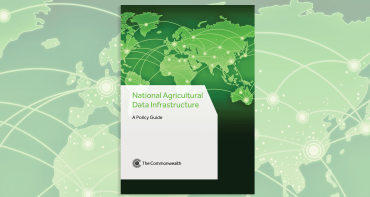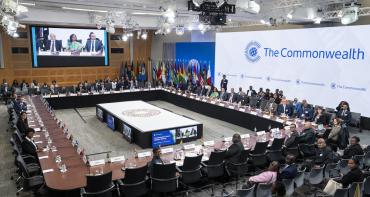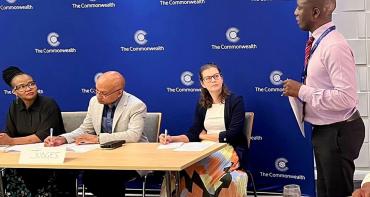Commonwealth Observer Group's Interim Statement on the 2015 National Assembly Election in Lesotho

“The Commonwealth Observer Group commends the people of Lesotho for the peaceful and orderly manner in which they exercised their franchise on 28 February. They have set the tone for the conduct of the results and post-election phases. We urge all candidates and political parties to follow their example.”
The Commonwealth Observer Group has been present in Lesotho since 22 February 2015. During this period, we have met with all major stakeholders including the Independent Electoral Commission of Lesotho (IEC), representatives of the main political parties, civil society organisations, church leaders, the media, representatives from the Lesotho Defence Force and the Lesotho Mounted Police Service, as well as other international and national observers.
The Group observed voting, counting and results processes in nine districts: Maseru; Berea; Mafeteng; Qacha’s Nek; Quthing; Mohale’s Hoek; Leribe; Butha-Buthe and Thaba-Tseka. Prior to Election Day, our teams met with electoral officials, security officials, national and international observers and other stakeholders at district level to gain a holistic appreciation of the pre-election day environment and preparations for the elections.
We issue this Interim Statement cognisant that the critical vote tabulation and results processes are still underway.
The Group reiterates its mandate to observe the organisation and conduct of the National Assembly Election in accordance with Lesotho’s Constitutional and Electoral Act, with reference to regional, Commonwealth and International commitments to which Lesotho has committed itself. We will consider the various factors impinging upon the credibility of the electoral process as a whole, and offer recommendations as relevant, in our Final Report.
Key findings
Pre-election environment
We witnessed the conclusions of the main rallies that were held in Maseru on our arrival on 22 February. We note that these rallies, and the campaign period were calm and peaceful overall. The fundamental rights of candidates, political parties and supporters to assemble and campaign were broadly observed. However, in our briefings, attention was drawn to the polarisation of certain media along political lines and the general lack of professional standards in media coverage of the campaign.
Opening and Voting
On polling day, our observers reported that voting stations opened on time and observed the established procedures. There were adequate materials to facilitate voting, and the voting environment and layout generally respected the secrecy of the ballot.
We conclude that voting was conducted in a peaceful manner. Our observers reported positively on the competence and professionalism of the many young people and women who served as polling station officials; they appeared to be well trained, and communicated openly and clearly to party agents. Where there were incidents, they were resolved in an inclusive manner with the party agents, creating an atmosphere of transparency and collegiality. We expect this positive spirit to characterise the rest of the process.
We commend the IEC, polling officials and security personnel on duty for their dedication and commitment on election day.
The Group further commends the people of Lesotho for the peaceful and orderly manner in which they exercised their franchise. They have set the tone for the conduct of the results and post-election phases. We urge all candidates and political parties to follow their example.
Closing and count
At stations observed by the group, polls closed at the prescribed time. The closing, vote-counting and tabulation procedures appeared in line with established protocols and were conducted in a transparent manner by polling officials. Counting was manual and sometimes arduous, owing to the prescribed detailed procedures for accuracy and transparency.
We urge the IEC to explore ways of streamlining the counting process in future elections, while safeguarding accuracy and transparency. We further urge the IEC to provide adequate lighting to facilitate the counting process.
Conclusions
The poll was inclusive. We witnessed the participation of elderly and disabled voters, and were encouraged by the presence of women and youth as voters and officials. During our briefings, we were informed about efforts made to ensure the participation of ‘herd-boys’. This participatory approach augurs well for Lesotho’s democracy and development.
We also highlight the role of political party agents who were widely present in polling stations during voting and counting. They appeared to cooperate with polling officials in an atmosphere of tolerance, respect and trust.
In our briefing sessions we were impressed by the role of church leaders and civil society representatives in promoting voter education and dialogue between parties and ordinary Basotho, especially in rural areas. We believe that they contributed positively to the conduct of the polls, including as domestic election observers.
The Group met with all the major political parties and was assured by each of them that they would accept the results of a credible electoral process. We were informed that political parties had signed a pledge to this effect on 21 February at a prayer service in Maseru. We took these assurances as a firm demonstration of their commitment to a democratic and peaceful process.
For any election management body, a snap election can present significant logistical and administrative challenges. The IEC appears to have overcome these, and has so far delivered a successful, transparent and peaceful process. We commend its professionalism, and its inclusive and consensus-based approach to addressing challenges, as well as its proactive communication to the public and with key stakeholders. The timely release of results, in itself, has contributed to creating a calm environment.
Based on our observation and consultations with a broad range of stakeholders, our preliminary conclusion is that the elections were peaceful and well conducted. The shortfalls observed to date by members of the Group are not of a magnitude significant enough to question the credibility of the outcome.
In our Final Report, we will reflect on possible areas for improvement. This report will be submitted in due course to the Secretary-General of the Commonwealth who will subsequently share it with relevant stakeholders before it is made public.
We call on all Basotho to sustain the positive spirit of peace, tolerance and commitment to democratic values that characterised election day, the counting and results processes. Lesotho is in a position to break from past cycles of political intolerance. The Commonwealth is confident that Lesotho can achieve this.



